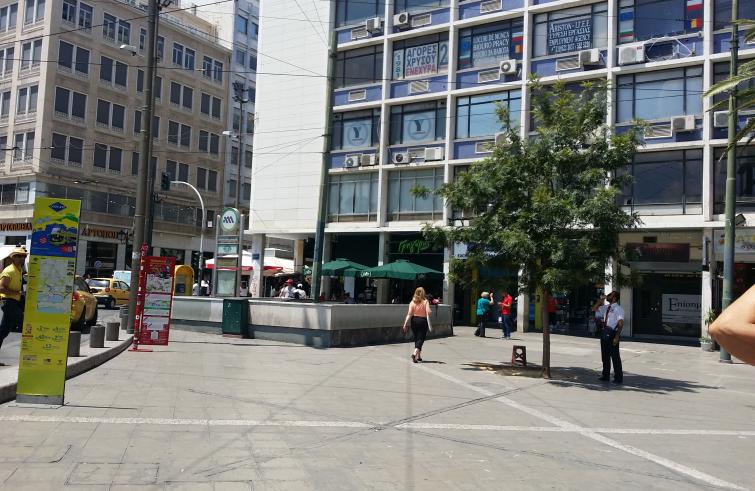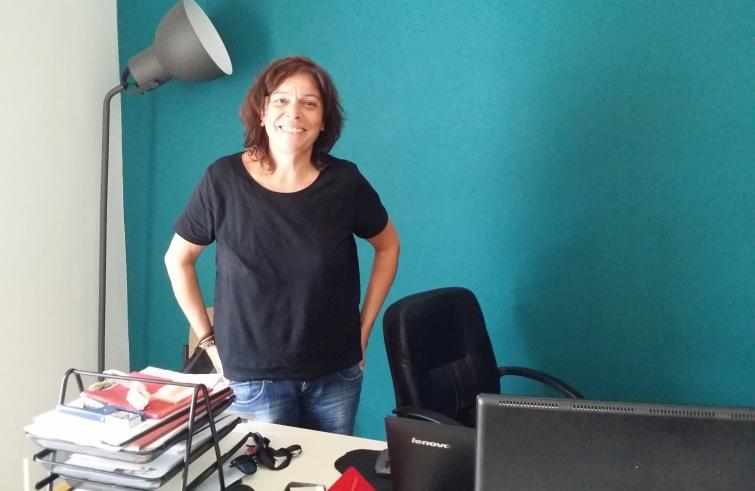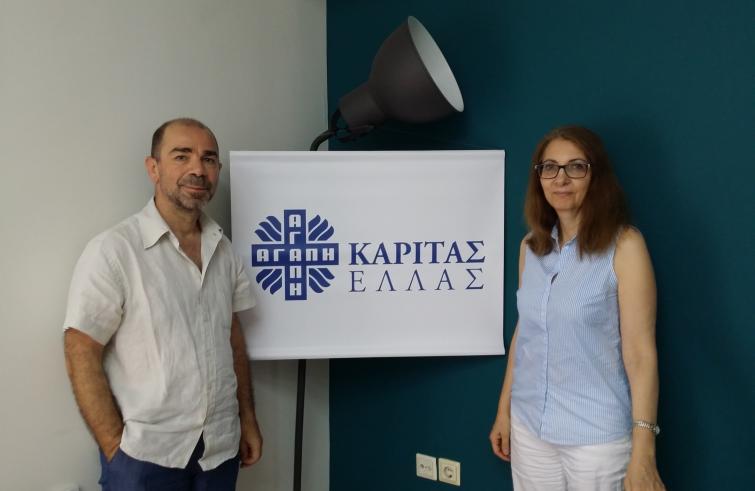
Syntagma Square and Omonia Square: the former is central and elegant, housing the Greek Parliament, it’s an intersection of six roads. The latter is chaotic, noisy , its surrounding areas run-down. The Greek crisis could be described also through its two main squares. The bailout program set by the Troika – EU, ECB and IMF- in May 2010 to avoid bankruptcy will end August 20. Populated with flows of tourists coming and going from the Metro station, considered one of the most beautiful in the world, adorned with marble decors and antiquities, Syntagma Square, (“Constitution Square”), epitomizes the face the of Greece that wants to recover full citizenship in EU28, also in the light of its thousand-year long history, after an eight-year-long recession.

Athens: Omonia Square
A few blocks away, Omonia Square, or “Harmony Square”, still bears the open wounds of eight years of crisis, which in the Greek capital nobody thinks is over. There is little harmony to be seen around here. Thus it is no surprise that only 2% of the Greek population – according to a Eurobarometer survey of March 2018 – declared themselves happy about the economic situation in the Country and that 50% believe that the worst of the crisis is yet to come. Poverty emerges around the Square in the lowered shutters and the dilapidated buildings or fallen into disrepair, while shops of various kinds strive to resist with dignity to the tax constraints imposed by the government to meet the commitments taken with the Troika. Thus while people many fill the streets on their way to work, many more are stationed under malodorous porticoes, including migrants of different nationalities and many
Greek natives who lost their jobs and their hopes.

Athens: standing on line before the Caritas soup-kitchen
Their fixed appointment is with the real meal of the day, served in the soup-kitchen of Caritas Athens, located only 300Mt away from Omonia Square. They all patiently stand on line from the early morning hours, when the first volunteers arrive to prepare the meals. Little by little the queue starts to grow, competing with the line of cars waiting at the red traffic light across the street. No one honks their horns; it’s almost a sign of respect for those who are there waiting for a meal. Queues extend to the staircase that winds round the elevator that goes up and down the seven floors of the building that houses not only the soup-kitchen, but also the rooms where volunteers are busily trying to meet the basic needs of many people who bear the scars of the crisis. Here are located also the offices of Caritas Greece run by Maria Alverti.

Maria Alverti
“It’s a difficult situation”, she said while sipping the last drops of coffee. We are not yet back on our feet. According to figures the crisis has been overcome, but the quality of life of the Greek population has grown worse. We have made – and we continue making – countless sacrifices, but we see no light at the end of the tunnel.” After eight years of drastic measures, Greece has not yet recovered from the crisis.
“It’s not a question of food shortage – said the Director of Caritas Greece -. The fact is that people are anguished and worn out because they can’t afford to pay their household bills. Everyday life is hurdled with obstacles resulting from unemployment, from a public healthcare system that no longer provides appropriate treatment – only provided upon payment -, salaries dropped dramatically and taxes escalated to over 60%, we suffered cuts to pensions and to the welfare state.
And do you know what’s the outcome of all of this?”. Another sip of coffee before the blunt reply:
“The Greek people have lost all faith in politics, in their political leaders, and most of all in the EU.”

In the folds of the Greek economic crisis emerges another crisis that is deeply-felt not only in Greece, which involves migration: “The Greeks feel betrayed by their EU partners not only for the austerity policies imposed on the country but also because they feel they have been left alone to deal with migratory waves.” Today the front of this migratory crisis bears the names of the islands of Lesbos, Chios, Samos, Kos, where hotspots were set up to register new arrivals and where 13 thousand out of approximately 50 thousand migrants and asylum-seekers in Greece are trapped. (Source: International Migration Organization)
“Faced with this situation, Greek society is inert and it does not seem to react. In doing so the Greek people fail to honour their great history. The growth of the far-right movements, such as Golden Dawn, is a result of this attitude.”
Was the crisis caused by EU policies, or do the Greek people and the their political leaders share part of the blame? Did the past eight years serve to undertake what could be defined as a “national conscience examination”?
“We did not make an examination of conscience over our mistakes – Alverti replied -. Yet I believe that the Troika’s measures had to be shared and not imposed. We underwent 16 pension cuts. The people – and not our political leaders – suffered the consequences of these measures. Now they are trying to lower salaries to the level of Balkan countries, but prices are due to rise, thereby resulting much higher compared to other European countries.”
Is there a population bracket in Greece that suffers the greatest impact of the economic and financial downturn?
“Young people – remarked the Caritas Director – are among the most vulnerable. The hopes of change are entrusted to them, because of their higher education, because they are dynamic and creative. But they can’t be paid 400 euros a month, often off the books, to work up to twelve hours a day. You can’t live this way. They cannot be independent, pay their insurance and spend money to promote consumption and trade. Many young people have grown discouraged and that’s also why they gave up working all together.
Today people break up in tears when they think back to the well-being they enjoyed before the crisis.
“But this approach hinders recovery, as it prevents – especially young people –conceiving new paths of employment. Some jobs are not taken into account, especially by those with higher education qualifications. They prefer leaving the Country. Since 2010 more than 500 thousand young people have emigrated from Greece and the haemorrhage continues, in the light of youth unemployment that exceeds 40%. There is a concrete risk of becoming a ageing country, which would make it impossible to rehabilitate the economy and repay the debts.”
What is needed to revive the Country, given the termination of the Troika bailout programme?
“Appropriate policies to support new entrepreneurship and diversification of investments. The crisis – Alverti pointed out – has also set into motion virtuous practices in the area of agriculture, of alternative businesses, of tourist services. We are witnessing the creation of small enterprises that are trying to exploit the few possibilities that the crisis and the market offer. The immigration phenomenon is creating jobs in the business sector linked to reception and hospitality such as interpreters, cultural mediators, social workers and psychologists. Unfortunately, taxes are a burden to growth and they threaten to annihilate businesses before they take roots.”

Lisetta Milliari and Stanislao Stouraitis
While waiting to see a light at the end of the tunnel Caritas brings forth her commitment for the poor and destitute, as told by Lisetta Milliari and Stanislao Stouraitis, respectively head of administration and responsible for the promotion of Caritas Greece. “It’s a major effort –they said – and the shortage of funds forces us to find new ways to finance our projects. We ask our benefactors for some more help. We started with an office of 5 people but with the arrival of migrants we have a staff of 135 people – including salaried and volunteer workers. We carry out the projects supported by Caritas centres across Europe, primarily Caritas Italy. Their support is not confined to financial support, as it also includes the planning phase.” But now they have a major concern:
“Some organizations will be reducing their funds after the termination of the Troika bailout programme. They erroneously believe that we will no longer be needing their support. But it’s not true, the needs are the same, and they are bound to remain the same for a long time.”
This can be seen even as we walk down the stairs of the building: people are standing on lines in front of the various Caritas counselling offices. The queue for meals has grown much longer. At the end of its daily service the soup-kitchen will have fed 500 people, in addition to 100 children. The light at the end of the tunnel is still too far to be seen.














